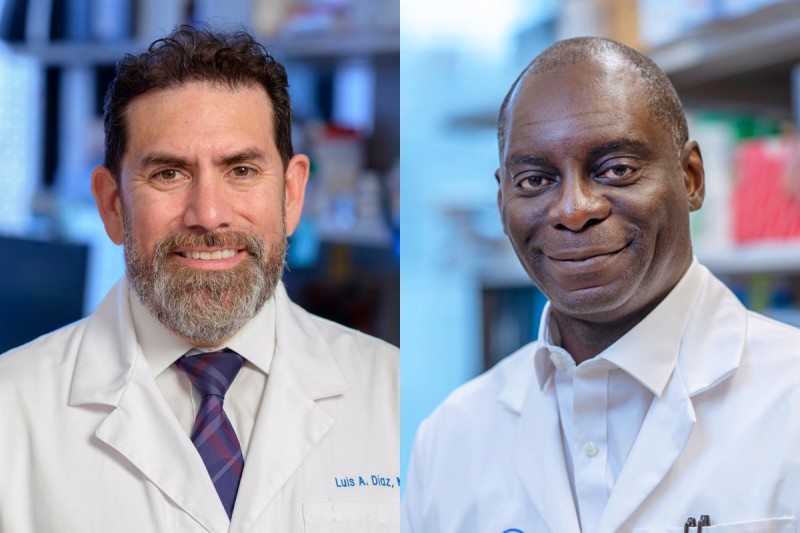
Luis Diaz Jr., MD, Head of the Division of Solid Tumor Oncology, and incumbent of the Grayer Family Chair, and Kojo S.J. Elenitoba-Johnson, MD, Chair of the Department of Pathology and Laboratory Medicine, Member in the Human Oncology Pathogenesis Program (HOPP), and the incumbent of the James Ewing Alumni Chair of Pathology at Memorial Sloan Kettering Cancer Center (MSK), have been elected to the National Academy of Medicine (NAM), one of the highest honors bestowed upon scientists worldwide. They join 23 other members of the MSK faculty conferred with this recognition.
Dr. Diaz is a renowned medical oncologist and expert in applied cancer genetics and immuno-oncology. Diaz helped spearhead the application of circulating tumor DNA as a cancer diagnostic and a strategy for monitoring the emergence of therapeutic resistance in the blood, and along with his colleagues, is developing a “molecular pap smear” to diagnose early-stage ovarian and endometrial cancer. In 2022, Diaz along with his colleague Andrea Cercek, MD, published a landmark study in The New England Journal of Medicine (NEJM) that showed for patients with certain gene mutations, immunotherapy completely eliminated their rectal cancer, enabling them to avoid side effects from the standard treatment of radiation, surgery, and chemotherapy. After more than two years, all 14 patients in the trial have remained cancer-free. His work on the landmark Keynote 177 study led to the FDA approval of the immunotherapy Pembrolizumab as a first-line treatment in patients with unresectable and microsatellite instability–high (MSI-H)/mismatch repair deficient (dMMR) metastatic colorectal cancer. Prior to joining MSK, Dr. Diaz was a Professor of Medicine at Johns Hopkins University.
Dr. Elenitoba-Johnson is an international leader in the fields of hematopathology and molecular genomic pathology, as well as translational research utilizing genomics and mass spectrometry-driven proteomics. An esteemed physician-scientist, Dr. Elenitoba-Johnson’s joined MSK in 2022 and has focused his research on the pathogenesis of hematolymphoid neoplasms. He is noted for developing unique approaches to the interrogation of whole genomes and proteomes for discovery of pathogenetic mechanisms. His work using whole genome sequencing revealed recurrent structural alterations in certain types of lymphomas that were not well understood before, including NOTCH2 in splenic marginal zone lymphoma, JAK/STAT5B in T-cell prolymphocytic leukemia, and the first comprehensive proteogenomic signaling network in ALK+ anaplastic large cell lymphoma. Before joining MSK, Elenitoba-Johnson held leadership positions at the University of Utah, the University of Michigan, and the University of Pennsylvania.
This year, NAM elected 90 regular members and 10 international members during its annual meeting.
Election to the Academy is considered one of the highest honors in the fields of health and medicine and recognizes individuals who have demonstrated outstanding professional achievement and commitment to service.
New members are elected by current members through a process that recognizes individuals who have made major contributions to the advancement of the medical sciences, health care, and public health. A diversity of talent among NAM’s membership is assured by its Articles of Organization, which stipulate that at least one-quarter of the membership is selected from fields outside the health professions — for example, from such fields as law, engineering, social sciences, and the humanities.
Established originally as the Institute of Medicine in 1970 by the National Academy of Sciences, the National Academy of Medicine addresses critical issues in health, science, medicine, and related policy and inspires positive actions across sectors. NAM works alongside the National Academy of Sciences and National Academy of Engineering to provide independent, objective analysis and advice to the nation and conduct other activities to solve complex problems and inform public policy decisions. The National Academies of Sciences, Engineering, and Medicine also encourage education and research, recognize outstanding contributions to knowledge, and increase public understanding of STEMM. With their election, NAM members make a commitment to volunteer their service in National Academies activities.

